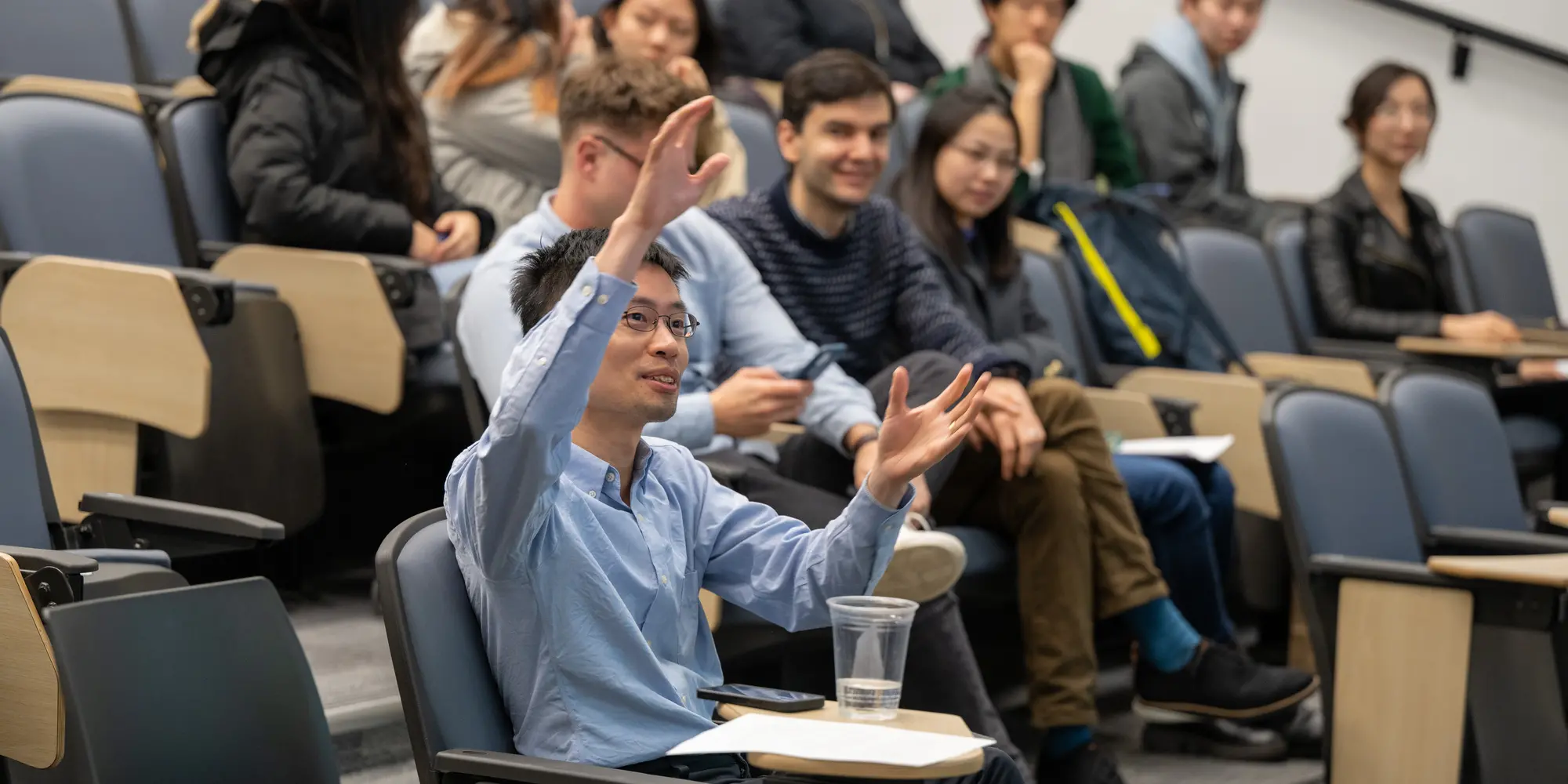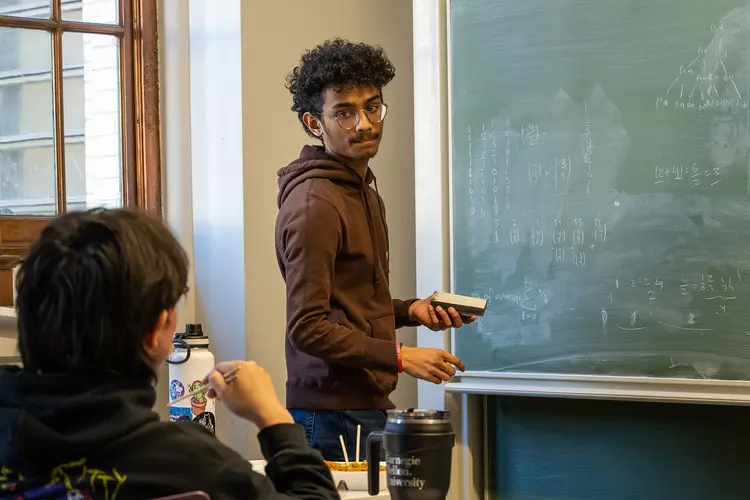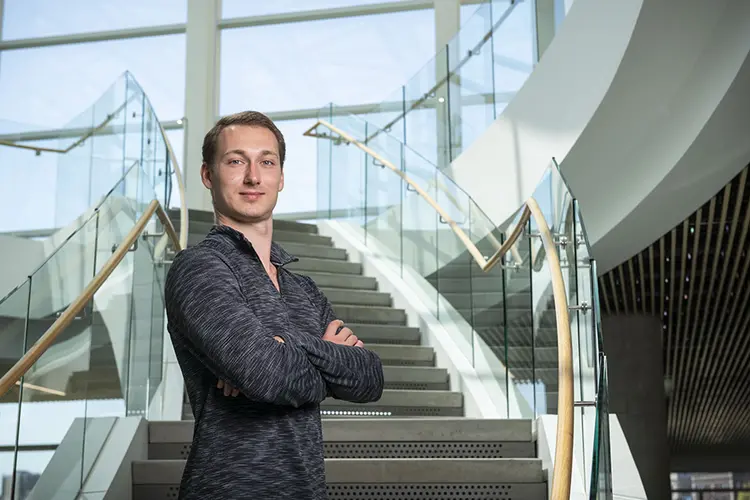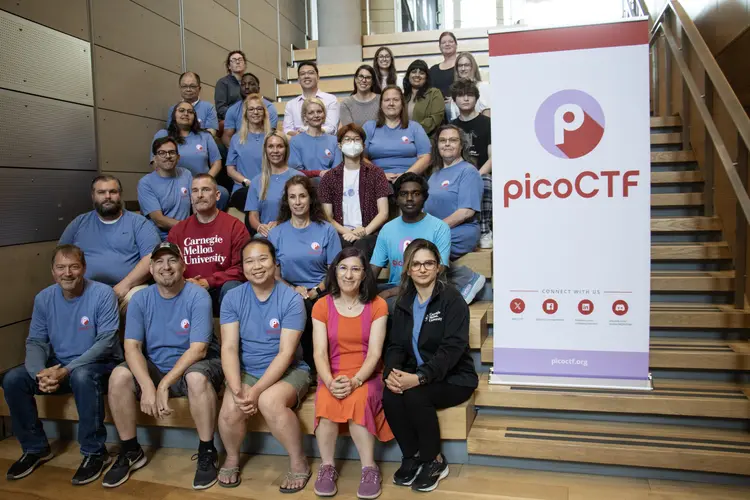
Po-Shen Loh: An International Man of Math
Carnegie Mellon professor reflects on 10 years of guiding the U.S. international Mathematical Olympiad Team
Media Inquiries
On July 22, the United States team took its fifth victory in the International Mathematical Olympiad in the past 10 years.
Carnegie Mellon University has been an international center for competitive math, and its faculty fostered an environment where each year’s team could prepare to show their skills to the world. Mathematical Sciences Professor Po-Shen Loh has been at the heart of it.
“If you want to change the world, it helps to be a little crazy,” Loh said.
From 2013-2023, Loh served as the head coach for the U.S. team that competed at the International Mathematical Olympiad, which placed first in the world four times during that time. He also oversaw training with the Mathematical Association of America’s Mathematical Olympiad Summer Program, which took place annually at Carnegie Mellon’s Pittsburgh campus from 2014-2024 and brought some of the world’s best high school math students together for training.
Loh, a professor in the Department of Mathematical Sciences in the Mellon College of Science(opens in new window), is an international evangelist for education and speaks about the need for “intellectual fearlessness,” which he said is one of the key aspects of learning for long-term success. His primary work now focuses on combining his national Olympiad experience and his insights from marathon speaking tours(opens in new window) to invent scalable solutions to uplift human intelligence and empathy(opens in new window), to help society thrive in the age of AI. When he took over the U.S. program, he decided to take a radical new approach to preparing mathletes for success.
“I said, ‘Well, if you put me in charge we'll probably do worse, because I'm not going to focus on how the students do this year. I'm more interested in maximizing the chance that I read about the students in the New York Times in 20 years,’” Loh said. “The kind of message that I sent had nothing to do with performance in the contest. It was more on the importance of having some sense of responsibility given all of these skills.”
Loh’s research covers concepts such as probability, combinatorics, algorithms and real-world applications of math. A recipient of the United States Presidential Early Career Award for Scientists and Engineers, he has sought to teach these subjects while conveying an enthusiasm for humanity to students. Known for this personable approach to education, he avoids emphasis on exact answers to mathematical problems in favor of creativity, exploration and human value.
Did You Know
2016 was a banner year for competitive math. Along with coaching the U.S. high school team to a win at the International Mathematical Olympiad, Loh also coached the Carnegie Mellon team to its first-ever win at the William Lowell Putnam Competition, the premier mathematics competition for undergraduate students in North America.
“If you want to change the world, it helps to be a little crazy.” — Po-Shen Loh
Reflecting on the past decade’s challenges and success, Loh said that the approach proved effective.
In 2015, Loh led the U.S. team to victory for the first time in 21 years. The team repeated its victory again in 2016 and Loh and the high school students were invited to the White House(opens in new window) for their achievements. Loh coached the U.S. IMO team to another set of consecutive wins in 2018 and 2019.
Today, Loh takes the same approach to his work as inaugural vice president for advancement at the International Mathematical Olympiad Foundation. As a high school student, he earned a silver medal at the 1999 IMO, and understands the pressure the competition brings. He spent much of his time at the 65th International Mathematical Olympiad(opens in new window) in Bath, United Kingdom, simply speaking with teams from around the world. The IMO took place July 11-22.
“I'm not actually here to represent one particular country anymore. My philosophy is that I like to connect the world,” he said, recounting conversations with teams and individuals from Rwanda, Malaysia, Ghana, Singapore, Slovakia and others. Loh has been connecting with thousands of students worldwide for years, having delivered talks in many cities to encourage more students to embrace high-level math.
He is focused on helping alumni stay connected globally.
“Before I had left as the U.S. Math Olympiad coach, I got this idea: ‘Wouldn't it be nice if we started an International Math Olympiad alumni reunion? I wonder if anyone's ever done this thing before.’ And the answer was no,” he said.
Loh organized the alumni reunion, which overlaps with the last two days of the International Mathematical Olympiad and goes on two days afterward. The hope, Loh says, is to facilitate real relationships.
“My inspiration to do this came from the great interactions I had with Carnegie Mellon's offices that worked with alumni, specifically University Advancement(opens in new window). Observing what interesting value can be unlocked by connecting with alumni to support — in huge ways — the mission that we do as a university. These were inspiring to me.”
Another aspect of his work has stayed similar despite the change in scale between coaching U.S. students and his new role at the IMO: A drive to help people anywhere, at any stage, think outside the box to tackle big-picture problems. In 2020, his “Ask Math Anything(opens in new window)” series gave people a chance to hear his expert opinions during a critical time.
The ability to tackle problems in this way will be more important as technology advances, and mathematical complexity with it, Loh said.
“You have to be willing to bite off a project like, ‘Can we help control pandemics?’ ‘Can we find a way to teach enormous numbers of people how to solve problems they haven't seen before?’ or ‘Can we find a way to help the general public survive the rise of AI?” Loh said. “These are the kinds of things that I'm working on, and you have to have a certain level of fearlessness to start.”


